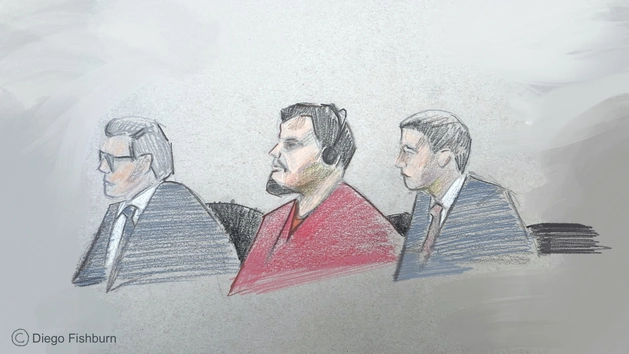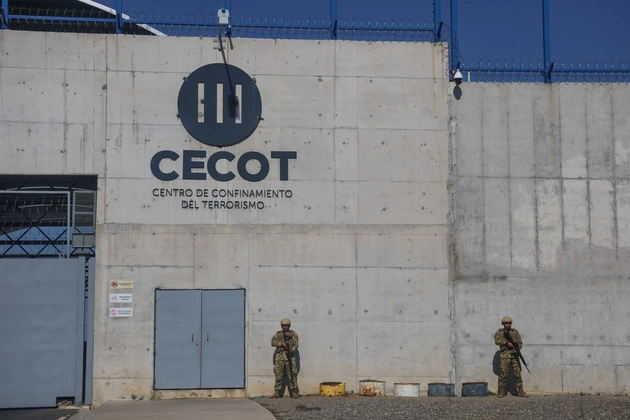https://www.politico.com/news/2025/07/02/kilmar-abrego-garcia-salvadoran-prison-account-00438153
Kilmar Abrego Garcia describes ‘severe beatings’ and ‘psychological torture’ in Salvadoran prison
Abrego submitted a harrowing and detailed account of abuse after the Trump administration illegally deported him.

This courtroom sketch depicts (from left), attorney Sean Hecker, Kilmar Abrego Garcia and attorney Rascoe Dean in court during a court hearing on June 25, 2025, in Nashville, Tennessee. | Diego Fishburn/AP
By JOSH GERSTEIN and KYLE CHENEY07/02/2025
Kilmar Abrego Garcia, whose illegal deportation by the Trump administration captured national attention, is now offering a chilling account of his mistreatment in a Salvadoran prison, claiming he suffered “severe beatings,” sleep deprivation, malnutrition and other forms of torture at the hands of his jailers.
Abrego, a native of El Salvador, revealed details of his time in the country’s notorious anti-terrorism prison in a legal filing Wednesday. It’s the first time he has provided a firsthand description of his experience after the Trump administration summarily deported him there in March in violation of a court order.
The administration for months resisted a judge’s command to bring Abrego back to the United States. But last month, federal prosecutors secured an indictment against him in Tennessee for human smuggling. At that point, the administration arranged for him to be released from Salvadoran custody and returned to the U.S. to face those charges.
The Salvadoran prison where Abrego was initially housed, known as the Anti-Terrorism Confinement Center or by its Spanish-language acronym CECOT, is reputed to be rife with gang violence and human rights abuses. But there are few first-hand accounts of treatment there because El Salvador’s president, Nayib Bukele, has vowed that its prisoners will never be released.
Abrego’s account of physical and psychological torture stands in stark contrast to the portrayal by the Trump administration and Bukele, who posted a photoof what he claimed was Abrego having “margaritas” with Sen. Chris Van Hollen (D-Md.), after the senator secured a meeting with Abrego in April. (Van Hollen has since said the margaritas were staged by Salvadoran officials). The Trump administration told a federal judge in May, after Abrego had been moved out of CECOT to another prison, that he was “in good health” and had “gained weight.”
But Abrego said he lost 31 pounds at CECOT in his first two weeks there. And he reported witnessing and suffering harrowing violence and abuse.
Abrego’s lawyers presented his account in a 40-page proposed amendment to a lawsuit over his deportation.
Asked about the court filing, a spokeswoman for the Department of Homeland Security accused the media of “falling all over themselves to defend Kilmar Abrego Garcia.”
“The media’s sympathetic narrative about this criminal illegal gang member has completely fallen apart, yet they continue to peddle his sob story,” the spokeswoman, Tricia McLaughlin, said.
Abrego allegedly entered the U.S. illegally around 2011 and had lived in Maryland for more than a decade when the Trump administration deported him. The deportation violated a 2019 order from an immigration judge who barred the U.S. from sending Abrego to El Salvador because he faced a danger of gang violence there. The Supreme Court noted that the deportation was “illegal” after a Justice Department lawyer admitted that the deportation had been a mistake.
‘Whoever enters here doesn’t leave’
In the new court filing, Abrego described being the first person off an airplane in El Salvador after the Trump administration flew him there with more than 200 men on March 15. He recalled bright lights illuminating the airfield and cameras trained on him while officials forcefully guided him — shackled in chains — to a bus. The next day, Bukele triumphantly circulated cinematically edited videos of the deportees being handed over to Salvadoran authorities.
The officials repeatedly struck Abrego in the head, his lawyers wrote, summarizing his account. He observed a U.S. immigration agent communicating with the Salvadoran officials “to confirm the identities of the Salvadoran nationals on board before the bus departed,” the lawyers continued.
“Upon arrival at CECOT, the detainees were greeted by a prison official who stated, ‘Welcome to CECOT. Whoever enters here doesn’t leave,’” according to the account. “Plaintiff Abrego Garcia was then forced to strip, issued prison clothing, and subjected to physical abuse including being kicked in the legs with boots and struck on his head and arms to make him change clothes faster. His head was shaved with a zero razor, and he was frog-marched to cell 15, being struck with wooden batons along the way.”

Members of the Salvadorian army stand guard at maximum security penitentiary CECOT (Center for the Compulsory Housing of Terrorism) on April 4, 2025 in Tecoluca, San Vicente, El Salvador. | Alex Peña/Getty Images
“By the following day, Plaintiff Abrego Garcia had visible bruises and lumps all over his body,” his lawyers continued.
Abrego said he shared a cell with 20 other people, who were forced to kneel overnight, “with guards striking anyone who fell from exhaustion.”
“During this time, Plaintiff Abrego Garcia was denied bathroom access and soiled himself,” according to the account. “The detainees were confined to metal bunks with no mattresses in an overcrowded cell with no windows, bright lights that remained on 24 hours a day, and minimal access to sanitation.”
His lawyers also described “psychological torture,” with prison officials telling Abrego he would be moved to cells with gang members. Abrego indicated he witnessed violence among inmates in those cells, with prison guards declining to intervene.
Abrego was held incommunicado for over a month with no ability to contact his family or consult a lawyer, according to the account. His first contact with the outside world occurred when Van Hollen visited him on April 17, his lawyers wrote.
Rebutting alleged gang ties
The new court filing also seeks to undercut the Trump administration’s claims about Abrego, including the assertion that he is an MS-13 gang member. President Donald Trump has repeatedly made such a claim, even falsely insisting in a TV interview that Abrego has “MS-13” tattooed on the knuckles of his left hand.
However, Abrego claims prison officials at CECOT with extensive experience dealing with MS-13 and other gangs examined his tattoos and saw nothing to signify gang membership.
“The Salvadoran authorities recognized that Plaintiff Abrego Garcia was not affiliated with any gang and, at around this time, prison officials explicitly acknowledged that Plaintiff Abrego Garcia’s tattoos were not gang-related, telling him ‘your tattoos are fine,’” Abrego’s lawyers wrote in the submission to Greenbelt, Maryland-based U.S. District Court Judge Paula Xinis.
Xinis herself has also said that the Justice Department failed to produce evidence to support its allegation that Abrego is affiliated with the gang.
Abrego’s new court filing also alleges that in the days after Abrego was arrested in Maryland in March, U.S. Immigration and Customs Enforcement officials lied to him by indicating he’d see a judge before he’d be deported. Those false assurances were part of a deliberate effort “to prevent him from taking actions to assert his legal rights,” the new complaint says.
Abrego is currently detained in Tennessee while his criminal case is pending. Though a federal magistrate judge ordered his release from custody last month, Abrego asked to remain incarcerated until at least mid-July, following conflicting statements from the Trump administration about whether it would rapidly deport him once again — this time to a country other than El Salvador.